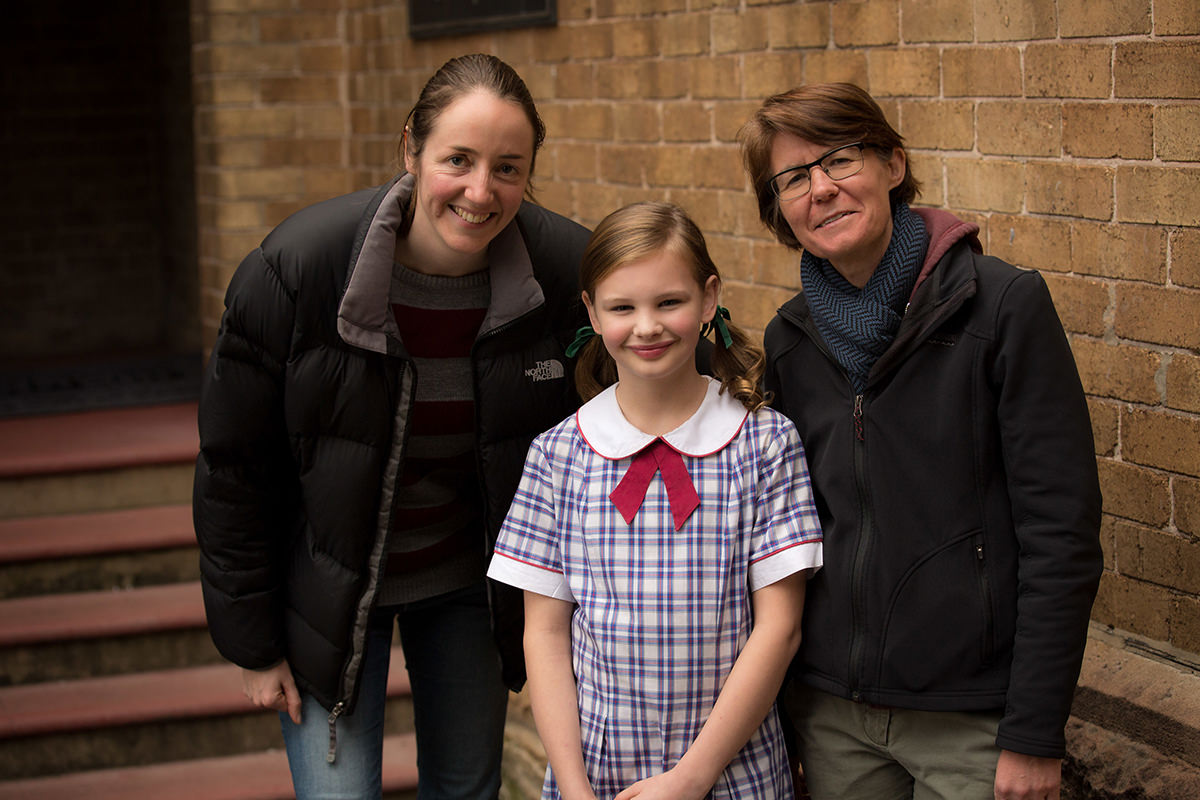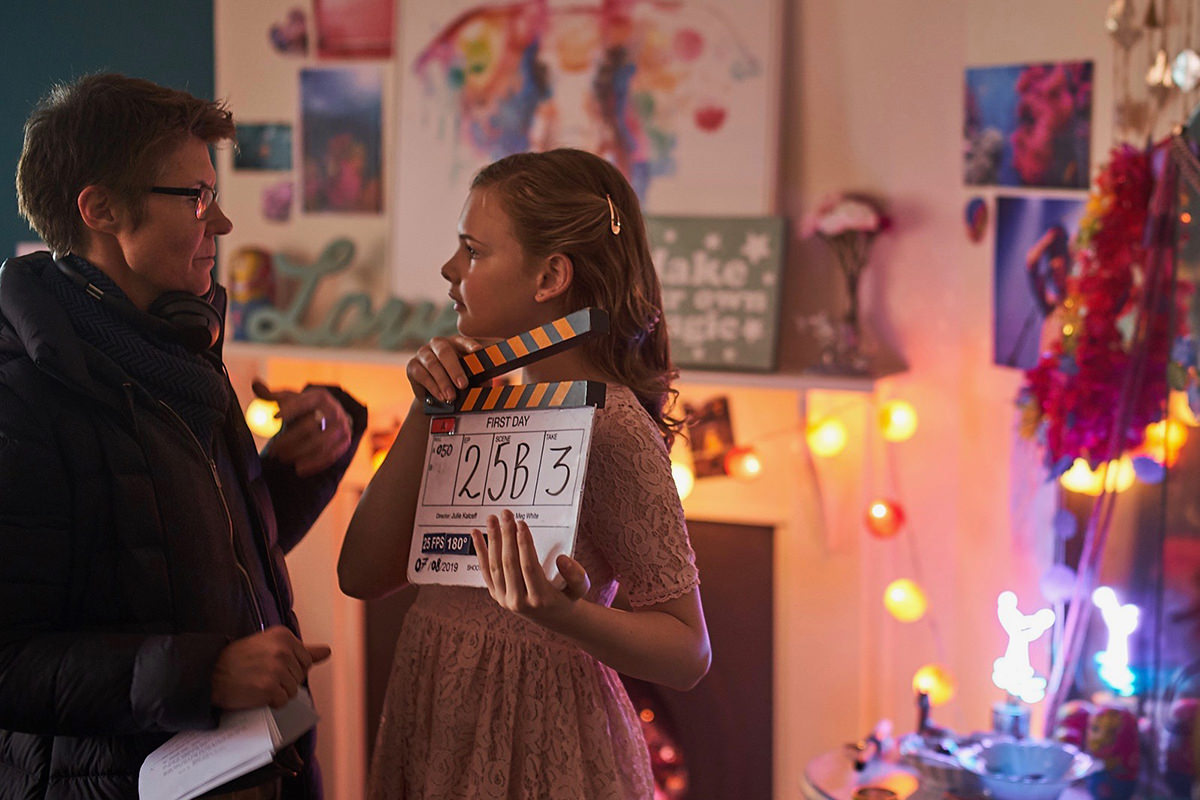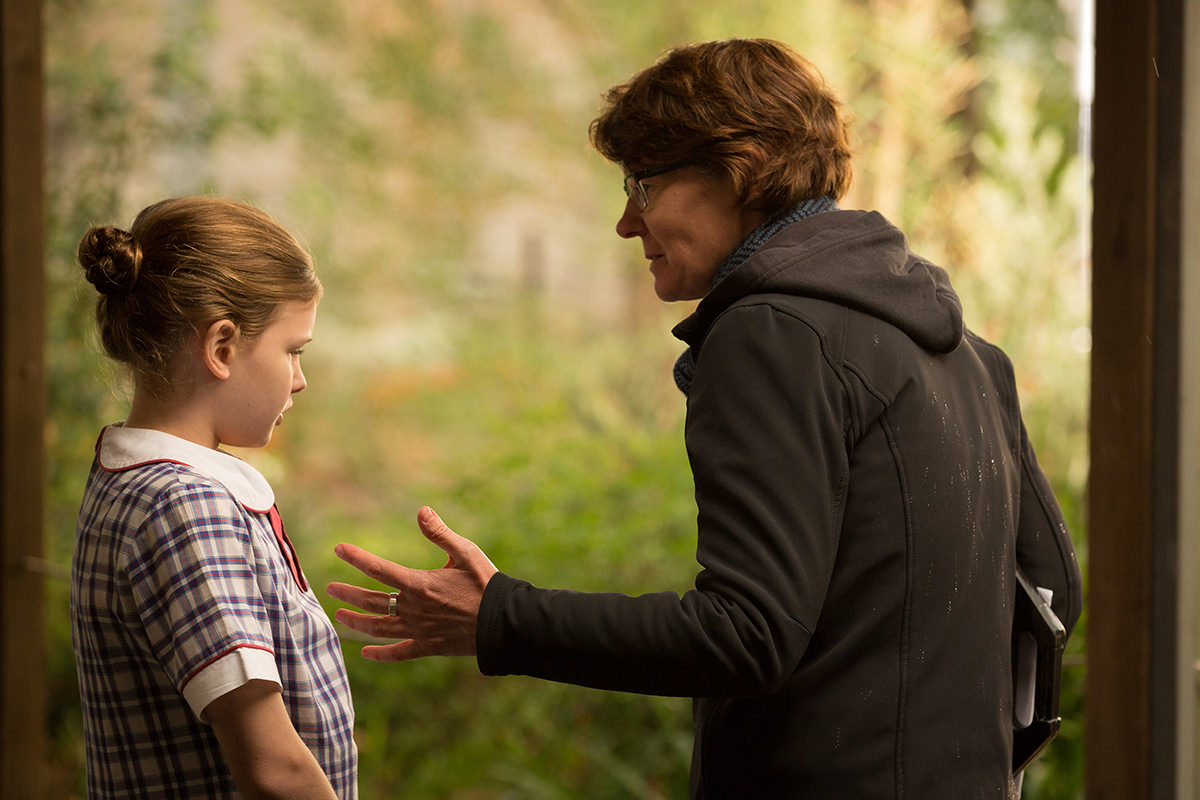Authentic Storytelling – First Day: a case study
Writer, director and producer Julie Kalceff on authentic casting, working with communities and learnings from First Day.
 Kirsty Stark, Evie Macdonald and Julie Kalceff on the set of First Day (Photo credit: Nick Prokop)
Kirsty Stark, Evie Macdonald and Julie Kalceff on the set of First Day (Photo credit: Nick Prokop)
In the Authentic Storytelling series, members of the Australian screen sector share their thoughts on why authenticity is important, challenges they have faced, and how the industry can do better. Subscribe to Screen Australia’s newsletter for additions to the series.
Julie Kalceff is an award-winning Australian writer, director, and producer known for the ground-breaking television series First Day - the first Australian series to star a transgender actor in the lead role – and the digital drama series Starting From Now, which has amassed more than 170 million views in 230 countries. Julie founded and is director of the Sydney-based production company Common Language Films.
Origins Of The Series
Authentic storytelling starts with telling a story you believe in, a story that means something to you, not just an opportunistic attempt at ticking boxes because you think it will attract funding.
First Day, a four-part half-hour children’s television series about Hannah Bradford, a 12-year-old transgender girl starting high school, began as a stand-alone 20-minute episode. It was commissioned by the ABC as part of an initiative they were running in conjunction with Screen Australia for the International Day of the Girl. I remember seeing callouts for applications and dismissing them. I’d just finished writing, directing and producing five seasons of the online drama series Starting From Now, as well as developing a project through the Gender Matters development fund, and I was exhausted. Besides, I didn’t do children’s television and it wasn’t something I’d ever thought of pursuing.
But at the same time, someone I knew, a six-year-old transgender girl, was starting her social transition. I saw how happy she was to finally be able to present to the world as her true self. I also saw how her Mum was determined to support her daughter, but wasn’t sure how to best do that. As far as she was aware, she didn’t know any other transgender children, or parents of transgender children, so was trying to find the best way forward on her own. The thought struck me – wouldn’t it be great if there was a children’s television episode about a transgender girl so they could watch it and feel less alone?
I contacted producer Kirsty Stark. Kirsty and I hadn’t worked together before but she was someone I respected. I thought we shared similar values and a similar approach to our work. Kirsty and I put in a submission to the ABC, skeptical as to whether or not they would choose a project with a transgender girl as the protagonist. But they did. The ABC Children’s Department at the time, in particular Michael Carrington, Libbie Doherty and Jan Stradling, were incredibly supportive of the project from the very beginning. They embraced the concept and agreed with us that we should cast a transgender actor in the role of Hannah.
Importance Of Authentic Casting
The absolute minimum we should be doing when telling stories that feature transgender characters is cast transgender actors in those roles.
Kirsty and I had spoken about authentic casting at length prior to submitting the application. We also talked about the fact that as cisgendered women, we were embarking on telling a story about a transgender character. As a white, cisgendered, middle-class lesbian, I acknowledge that First Day isn’t my story to tell. But as a white, cis, middle-class lesbian, I’m aware that I’m in a privileged position within my community and, as such, I have the resources to tell this story. After much deliberation, we realised our job was to find the right actor for the role and give her the support she needed to bring First Day to life.
We did, however, have some concerns. We not only had to find a 12-year-old transgender girl who could act (Hannah is in every scene and carries the weight of the narrative on her shoulders), but one who was in a position to deal with the attention that may come with being on the national broadcaster. But we did find her. Anyone who argues it’s impossible to cast authentically or those actors just don’t exist, hasn’t tried hard enough. Not only that, what we thought would be our biggest challenge turned out to be our greatest strength.
Evie Macdonald, in her first acting role, plays Hannah Bradford in First Day, and she is phenomenal. It was the depth and nuance she brought to the role in the initial stand-alone episode that was central to the show’s success and, in my mind, one of the main reasons we were later commissioned to take First Day to series.
There has been much debate about the importance of casting authentically. For me, it’s very simple. If you cast a cisgendered actor to play a transgender character, you are fueling the misinformation and ignorance that exists about transgender people. You are reinforcing the false notion that a transgender girl is really a boy who chooses to present to the world as female. Viewers form opinions about minority groups as a result of what they see on screen. Screen stories have the power to create empathy and understanding. They also have the power to do a great deal of harm.
Transgender actress, writer and activist Jen Richards puts it more eloquently than I can in the incredibly powerful documentary about trans representation, Disclosure: “Having cis men play trans women in my mind, is a direct link to the violence against trans women … part of the reason that men end up killing trans women out of fear that other men will think that they’re gay for having been with trans women, is that the friends, the men whose judgment they fear, only know trans women from media and the people who are playing trans women are the men that they know.”
And as Evie herself says so succinctly: “You wouldn’t cast a cisgendered boy to play a cisgendered girl so why would you cast a cis boy to play a trans girl?”
 Julie Kalceff and Evie Macdonald on the set of First Day (Photo credit: Ian Routledge)
Julie Kalceff and Evie Macdonald on the set of First Day (Photo credit: Ian Routledge)
Working With The Transgender Community
It’s not enough to be seen to involve members of the community you’re representing on screen, you need to go in with an open mind and listen to what they’re saying.
I’m not transgender and it’s been a long time since I was 12 years old, so it was imperative to do the research needed to find the emotional truth and honesty needed to tell this story.
It was important to us to show Hannah as a three-dimensional character with different interests and hobbies. Our focus from the beginning was to make First Day about a girl starting high school, a daunting proposition for any 12 year old. Hannah experiences many of the same fears and concerns as other girls her age. We believed this approach would not only make the character feel more authentic, but make the story more universal. In short, we didn’t want the character to be solely defined as a trans girl. However, being trans is part of the character and it was important we did the work needed to get it right.
With both the original episode and First Day the series, Kirsty and I were aware of the importance of talking with members of the transgender community and involving them in the creative process. Before scripting, I tried to research as extensively as possible. This included speaking with parents of transgender children, transgender adults, and Evie herself. For the series, we held a writers’ room that included the parent of a transgender child and a transgender writer. Once the writing process began, we sent drafts of each script to key members of the transgender community, including Evie’s mother, Meagan.
It was incredibly important to us to not only find the truth and authenticity in the story, but to make sure we didn’t release anything into the world that was either harmful or negative. Screen stories offer a shared experience and give us a way to talk about how we’re feeling, especially if we haven’t previously been able to verbalise those thoughts. We wanted First Day to start conversations between parents and their children, between trans kids and their parents, and to show cisgendered children (and adults) how to be better allies. To help with this, prior to production, producer Kate Croser reached out to GLAAD. A US non-government media organization, GLAAD’s focus is on ensuring diverse and accurate representation of LGBTQIA+ people on screen. While the response from GLAAD was overwhelmingly positive, they still had some notes around some of the language in the scripts. I took their notes and made the necessary changes.
As with casting authentically, meaningful engagement with the community you are representing isn’t just the right thing to do, it makes your show better. However, this should never be tokenistic or exploitative but collaborative and paid. You are investing in telling your story the best possible way you can, and that’s something that should be valued.
Production and Release
You don’t know how people will respond to a project until it is released into the world. You need to make sure you have done everything you possibly can to ensure you are not causing members of the community you are representing unnecessary distress or harm.
As a writer/director I have no issue with making changes to dialogue in rehearsal and on set if the proposed change doesn’t alter the intention of the scene. I’d prefer the actors feel comfortable with the words and even have some ownership over them, than protect the precious dialogue I wrote months before. During rehearsal and filming of First Day I worked with the actors to bring as much authenticity to the performances and the dialogue as possible. There were occasions where this was true of age-appropriate dialogue and finding the authentic voice of the 12-year-old characters, as well non-actors using their own words to more easily connect with the material.
Prior to the release of the series, Kirsty and I created a Language Guide for use within the ABC and to distribute to the press. After consulting with the actors and their parents, the guide included the names of the out transgender actors (authentic casting extended beyond Evie and included Holly (the YouTuber), played by Sarah Rose Huckman, and Sarah, played by Jake Childs), their pronouns, and clear guidelines about the correct use of language when talking about transgender actors, characters and a transgender narrative.
Where possible, we tried to place Evie at the centre of any press opportunities to avoid having only cisgendered voices talk about a transgender character and story. We were mindful, however, that Evie is a teenager and tried not to place too many demands on her time.
 Evie Macdonald and Julie Kalceff on the set of First Day (Photo credit: Nick Prokop)
Evie Macdonald and Julie Kalceff on the set of First Day (Photo credit: Nick Prokop)
What We Could Have Done Better
You should always be open to improving, listening to others, admitting your mistakes, learning from them and striving to do better.
I’d like to think we did the best we could with the resources we had at the time but the reality is, you can always do better. There are things we will do differently with First Day Season 2.
Rather than limit the involvement of members of the transgender community to the writers’ room and script notes, two episodes of Season 2 will be co-written by transgender writers, constituting their first television credits.
As a four-part half-hour series, we shoot First Day in one block, similar to a feature film. As such, it doesn’t lend itself to having more than one director. However, this time around we will provide more on-set opportunities for trans and gender diverse filmmakers. This will be in the form of paid attachments that will provide a production credit and aid in skill development. This will also create a more diverse workplace. In Season 1 there were a number of transgender and gender diverse children on set as part of the cast and extras but they weren’t necessarily out. Including more trans and gender diverse adults as part of the crew will make it clear to Evie that she is not the only transgender person on set. She will not be perceived as the sole representative of her community, thus relieving some of the weight of responsibility of carrying that mantle. Having a crew that includes members of the trans community will only improve the series and add to the authenticity of the story.
It was only after we’d released the first season and received feedback from members of the transgender community who were impacted by some of the instances of bullying and deadnaming that we realized we should have included a trigger warning at the start of each episode. It’s our intention to do that with Season 2.
First Day has grown into something much bigger than we ever envisaged. My aim is to tell this story as best and as authentically as I possibly can. As a cisgender writer/director, I feel incredibly privileged to have had the opportunity to make First Day, however, I am not the best person to tell trans stories. My aim, moving forward, is to support transgender writers tell their stories, rather than be the one to generate those projects.
I’m sure there are things I’ve included in this article and decisions we made throughout the development and production of First Day that some people will disagree with. This is an ongoing discussion. I don’t have all the answers and I’m the first to admit that I’ve made mistakes, but I’m open to learning. I welcome any feedback, suggestions or comments that are constructive and can lead to more inclusive and authentic storytelling.
The views and opinions expressed in this article belong solely to the author and do not necessarily reflect the views or policies of Screen Australia.

What to read next
As LGBTQI+ representations become more commonplace, we look at the long road to mainstream acceptance in this two-part series.
11 Dec 2019
Stephen A Russell